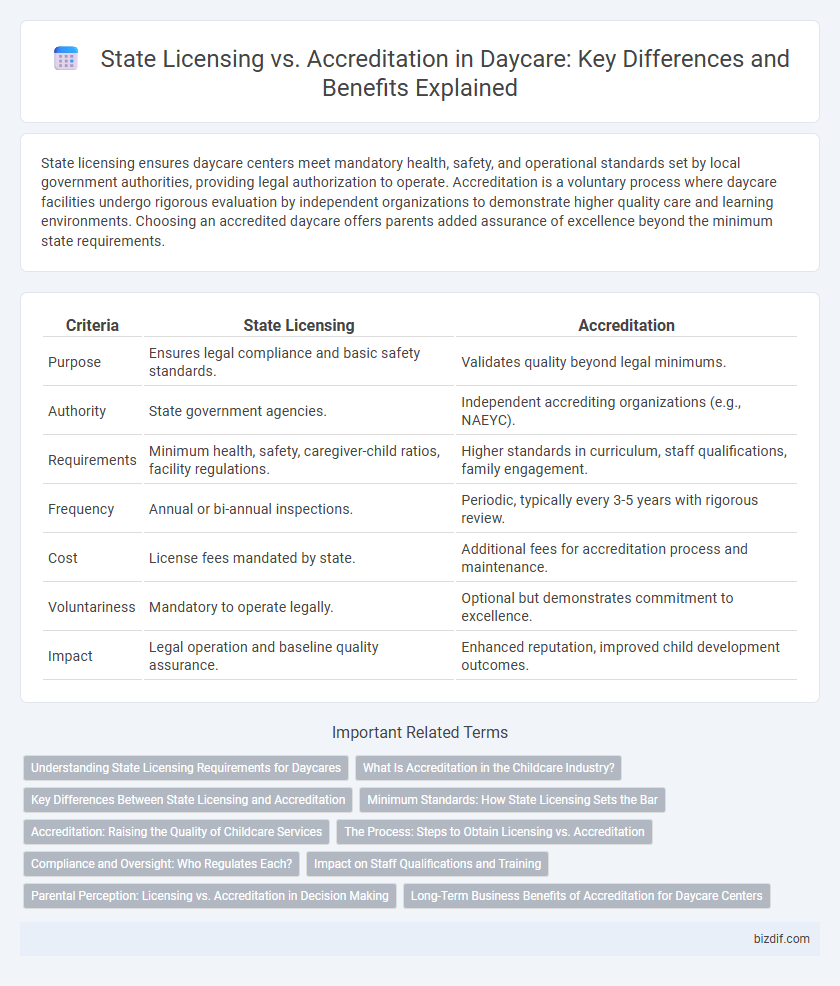State licensing ensures daycare centers meet mandatory health, safety, and operational standards set by local government authorities, providing legal authorization to operate. Accreditation is a voluntary process where daycare facilities undergo rigorous evaluation by independent organizations to demonstrate higher quality care and learning environments. Choosing an accredited daycare offers parents added assurance of excellence beyond the minimum state requirements.
Table of Comparison
| Criteria | State Licensing | Accreditation |
|---|---|---|
| Purpose | Ensures legal compliance and basic safety standards. | Validates quality beyond legal minimums. |
| Authority | State government agencies. | Independent accrediting organizations (e.g., NAEYC). |
| Requirements | Minimum health, safety, caregiver-child ratios, facility regulations. | Higher standards in curriculum, staff qualifications, family engagement. |
| Frequency | Annual or bi-annual inspections. | Periodic, typically every 3-5 years with rigorous review. |
| Cost | License fees mandated by state. | Additional fees for accreditation process and maintenance. |
| Voluntariness | Mandatory to operate legally. | Optional but demonstrates commitment to excellence. |
| Impact | Legal operation and baseline quality assurance. | Enhanced reputation, improved child development outcomes. |
Understanding State Licensing Requirements for Daycares
State licensing requirements for daycares establish mandatory health, safety, staff qualifications, and facility standards to ensure child welfare and compliance with local regulations. Licensing agencies conduct regular inspections and background checks, enforce staff-to-child ratios, and mandate training in emergency procedures and child development. Understanding these regulations is crucial for daycare providers to legally operate and maintain high-quality care environments consistent with state laws.
What Is Accreditation in the Childcare Industry?
Accreditation in the childcare industry is a voluntary process where daycare centers meet rigorous standards set by independent organizations such as the National Association for the Education of Young Children (NAEYC). This certification demonstrates a commitment to high-quality care, early childhood education, and continuous improvement beyond basic state licensing requirements. While state licensing ensures minimum health and safety standards, accreditation signifies a higher level of excellence in curriculum, teacher qualifications, and child development practices.
Key Differences Between State Licensing and Accreditation
State licensing ensures that daycare centers meet mandatory health, safety, and staffing regulations set by government authorities to operate legally, while accreditation is a voluntary process demonstrating higher-quality standards through third-party organizations like NAEYC. Licensing focuses on minimum compliance, including background checks and facility inspections, whereas accreditation evaluates educational curriculum, staff qualifications, and child development outcomes. Parents often view accreditation as a marker of excellence beyond basic legal requirements, providing assurance of superior care and early childhood education.
Minimum Standards: How State Licensing Sets the Bar
State licensing establishes minimum standards for daycare centers, ensuring basic health, safety, and caregiver qualifications are met. These regulations are mandatory and vary by state, covering aspects such as child-to-staff ratios, facility cleanliness, and emergency preparedness. Accreditation, on the other hand, is voluntary and reflects a higher level of quality beyond state-mandated requirements.
Accreditation: Raising the Quality of Childcare Services
Accreditation in daycare centers goes beyond state licensing by ensuring higher standards of care, structured staff training, and rigorous safety protocols, which contribute to improved child development outcomes. Unlike basic state licensing that meets minimum regulatory requirements, accredited programs undergo comprehensive evaluations by organizations such as the National Association for the Education of Young Children (NAEYC). This process raises the quality of childcare services by fostering continuous improvement and adherence to best practices in early childhood education.
The Process: Steps to Obtain Licensing vs. Accreditation
Obtaining state licensing for daycare centers involves submitting an application, completing background checks, passing health and safety inspections, and complying with state-specific regulations. Accreditation requires a more rigorous process including self-assessment, documentation of educational programs, staff qualifications, and ongoing quality improvement measures aligned with standards from organizations like NAEYC or NAC. Licensing ensures legal compliance, while accreditation demonstrates higher quality benchmarks and a commitment to excellence in early childhood education.
Compliance and Oversight: Who Regulates Each?
State licensing ensures daycare centers meet minimum health, safety, and staffing standards regulated by state government agencies, providing mandatory compliance oversight. Accreditation is granted by independent organizations like the National Association for the Education of Young Children (NAEYC) and involves voluntary, rigorous evaluations that exceed state requirements. Licensing focuses on legal compliance and public safety, while accreditation emphasizes quality improvement and best practices through peer review and continuous self-assessment.
Impact on Staff Qualifications and Training
State licensing establishes mandatory minimum requirements for staff qualifications and training in daycare centers, ensuring baseline safety and care standards. Accreditation, such as from the National Association for the Education of Young Children (NAEYC), demands higher, more comprehensive professional development and specialized training for staff, promoting enhanced educational practices. These accreditation standards significantly improve staff expertise, leading to better child outcomes and overall program quality.
Parental Perception: Licensing vs. Accreditation in Decision Making
Parents often view state licensing as a basic requirement ensuring minimum safety and health standards in daycare centers, while accreditation is perceived as a higher benchmark indicating quality education and enriched developmental programs. Licensing provides legal assurance, but accreditation by organizations like NAEYC offers parents confidence in curriculum rigor, staff qualifications, and continuous improvement. This distinction significantly influences parental decision-making, with many prioritizing accredited facilities for long-term child development benefits.
Long-Term Business Benefits of Accreditation for Daycare Centers
Accreditation provides daycare centers with a trusted mark of quality that goes beyond basic state licensing requirements, enhancing their reputation and attracting more families. It promotes continuous improvement through adherence to rigorous standards, leading to higher staff retention and enriched child development outcomes. Investing in accreditation ultimately supports long-term financial stability and growth by distinguishing the center in a competitive market.
State licensing vs accreditation Infographic

 bizdif.com
bizdif.com